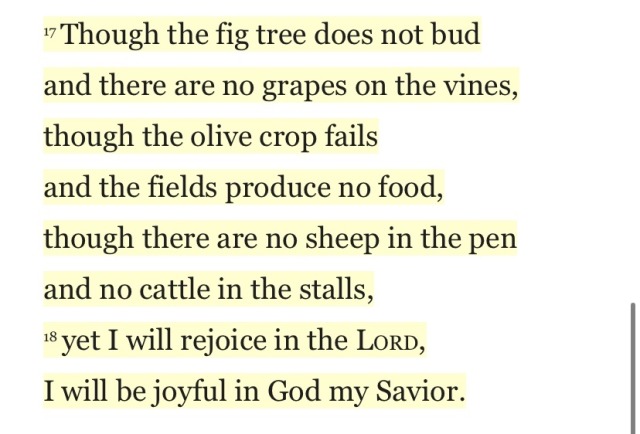Here’s a clever inspirational quote I heard recently: “Pursue your dreams every day that you’re alive. After that, don’t worry about it!”
This quote motivates by reminding me of my mortality, and then reminding me to make each day count. In other words, “you’ve only got this one life! Make the most of it!” Of course, good Christians will quickly point out that actually we believe that an eternal life is waiting for us on the other side. So maybe this quote doesn’t apply. And maybe any argument that uses the finiteness of our time on earth to motivate action will fail to have an effect on someone who believes they have eternal life.
This led me to wonder: does Christianity make people passive?
If the question were “does Christianity necessarily make people passive?”, the answer is no, because many have found Christianity to be a strong motivator to proactively pursue all sorts of things. But there are doctrines in Christianity that people definitely use to justify inaction either purposefully (to avoid having to do something), or inadvertently. The latter kind is usually combined with honest piety- if we believe God is powerful over all and that salvation is not based on our works but on God’s grace, then we ought never to speak as if our work or effort are decisive in obtaining certain outcomes. I have come to believe that this type of thinking, which grows out of a certain (well-intentioned) view of how God’s grace works, actually can lead to several distortions in the way we think of the way we make decisions and take action.
Distortion 1: Strong desire for anything besides “holy” things is sinful.
This is a development of the first commandment “thou shall have no other gods before me”. The idea is that God must be first in our hearts, and we must not be enslaved by other desires. But the distortion of this commandment forbids us from having strong desires for anything other than those vocations considered most “holy”, for fear that we have fallen into idolatry. It makes us suspicious any time we find ourselves excited about less “holy” things like music, exercise, art, career, and even friendships. So in order to protect ourselves from sin we suppress the desire, or to pretend we don’t have it. The end result of this kind of thinking starts looking like a type of Buddhism- aiming for the eradication of pain (in this case sin) via the eradication of desire.
Distortion 2: Only decisions that God has explicitly decided for me are legitimate, and Distortion 3: Spontaneity is more spiritual than planning.
I think this kind of thinking is everywhere. Many people will say, “I am waiting to hear what God wants me to do about X”. This is a pious, dependent impulse, but what is usually behind this is a fear that acting before God speaks in a direct, clear, and concise way is sinful, since this is depending on one’s own intellect, ability, etc. This fear of leaning on one’s own strength also comes out in protest against “too much planning”, as if using our own strength has an inverse relationship with how much God can work.
What all of these distortions have in common is an extremely sharp (and in my opinion, artificial) distinction between God’s word, work, and will and our intellect, actions, and determination. Once this distinction is made, our own effort is labelled as useless, since they are entirely separate from what God’s plans are for us. This leads us to think that our only duty as Christians is to wait and pray for deux-ex-machina type events where God acts or speaks in a sudden and decisive way, disregarding our own responsibility. This is the forth distortion:
Distortion 4: Effort is unnecessary for success.
The four distortions above are roughly the opposite of the four steps in
creating lasting change in our lives. In order to create lasting
change, whether that is learning a skill, developing in character, or
nurturing someone else, we must have 1) a strong desire to do so, 2) the
will to decide to change our current status quo, 3) a plan to help us
get there, and 4) the persistence to put that plan into practice each
day. After learning about these four steps for the first time, I was
told, you have the power to change your life and the lives of others for the better! I felt so empowered by this simple but powerful realization. And I wondered why I had never been told this in church.
If God always works and speaks in a way that would completely supersede any effort and intellect we can muster, then of course there is no point to our effort; let us just wait and see what God will do. But to me, it really does not seem like that is the way God has chosen to relate to this world. His mighty works are rare, but his imperceptible graces are everywhere. His voice is soft and often indirect, usually choosing to speak to us as we walk through life, rather than booming from a mountain all the time. And his blessing on consistent, careful, passionate work is clear, even from his first command to be fruitful and multiply, to have dominion over the earth. He has given us the ability, even the responsibility, to use our intellects and talents and effort to be fruitful on this earth and to show all creation the love of God. We must prayerfully seek for his guidance and power in all forms, and then rise determined to make decisions and execute plans to the best of our ability. Everything is by his grace, yes. Human beings have accomplished much all by the grace of God. But the grace of God has been given through the work of human beings, day in and day out. All Christians ought to join in on that work.







